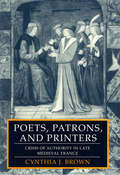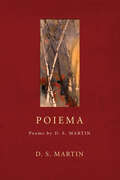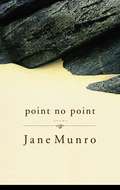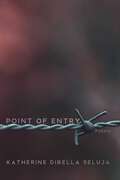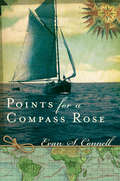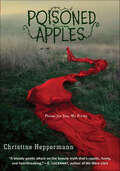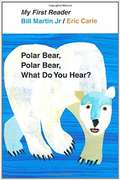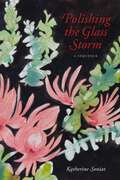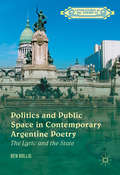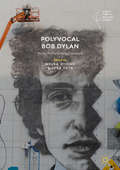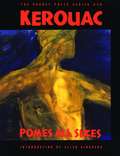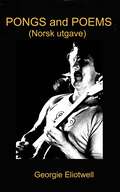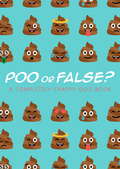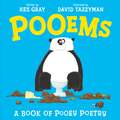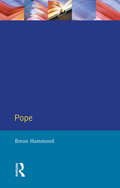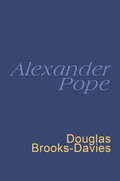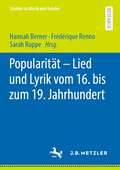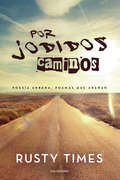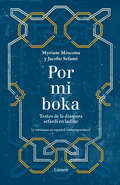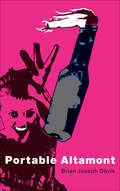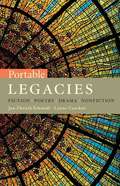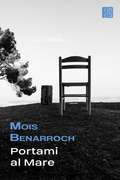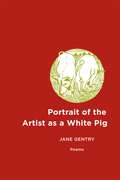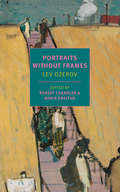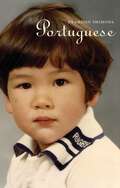- Table View
- List View
Poets, Patrons, and Printers: Crisis of Authority in Late Medieval France
by Cynthia J. BrownCynthia J. Brown explains why the advent of print in the late medieval period brought about changes in relationships among poets, patrons, and printers which led to a new conception of authorship.Examining such paratextual elements of manuscripts as title pages, colophons, and illustrations as well as such literary strategies as experimentation with narrative voice, Brown traces authors' attempts to underscore their narrative presence in their works and to displace patrons from their role as sponsors and protectors of the book. Her accounts of the struggles of poets, including Jean Lemaire, Jean Bouchet, Jean Molinet, and Pierre Gringore, over the design, printing, and sale of their books demonstrate how authors secured the status of literary proprietor during the transition from the culture of script and courtly patronage to that of print capitalism.
Poiema: Poems by D.S. Martin
by D. S. MartinD. S. Martin is a Canadian whose poetry has appeared in numerous literary journals and magazines such as Arc, Canadian Literature, Christianity & Literature, The Christian Century, The Fiddlehead, First Things, and Queen's Quarterly. His chapbook, So the Moon Would Not Be Swallowed, was published with Rubicon Press in 2007.
Point No Point: Poems
by Jane MunroPoint No Point’s title comes from a landform — an actual point on the west coast of Vancouver Island, which seems, when approached from the other side, to be no point at all — and it alerts us to the fact that Jane Munro’s poems are situated in a deep sense. They live in situ in the way they inhabit their native place, intimate with its mists, its mosses and lichens, with the salmonberry and false lily-of-the-valley of their ecosystem. They are also situated temporally, evoking sharply etched memories, visions, and dreams: a real-time visit to her father’s boatyard, a dream visit with her mother from a time before the poet was conceived, a flashback to the sixties rendered in extreme close-up. By their musical attunement and the acuity of the focus, they demonstrate how such deep situation may come about, how we might bring language to the task of living in a way which is fully present. In the long culminating poem, “Moving to a Colder Climate,” Munro brings all these elements into play, summoning her father’s bold obstreperous ghost to be present as a new house is built — situated — in this language. Her gifts as a poet — acuity, candour, musicality — make Point No Point a work of unforgettable witness.
Point of Entry: Poems (Mary Burritt Christiansen Poetry Series)
by Katherine DiBella SelujaIn this remarkable collection, Katherine DiBella Seluja explores issues surrounding human migration, juxtaposing poems about the current struggles along the US–Mexican border with her ancestors&’ experiences of migrating from Italy. Rich in sonic and sensory detail, these poems speak to the strength and resilience of those who leave their ancestral homes in search of safety and opportunities to thrive.
Points for a Compass Rose
by Evan Connell"We have here on the planet with us a man of such courage and strength of spirit that he has not lost what Alfred Adler calls 'the nerve for excellence.' He has kept it despite the burden of an awareness not only of the enormity of his project and of the limitations of his own human understanding, but also of the abject ignorance and indifference of his audience..."Somehow Connell makes you care. Many modern poets demand a good deal of work; Connell excites it. Sometimes the note-taker's [narrator] tone is hectoring, even belligerent; if you have any competitive spirit at all, you seize a thread-any thread-follow it, and lo, it traces a pattern... you understand at last that these notes are not tentative explorations, and far less are they 'expression:' they are instead the magnificent artifices of a giant intellect..."These poems are masterpieces. You could bend a lifetime of energy to their study, and have lived well. The fabric of their meaning is seamless, inexhaustible... their language is steely and bladelike; from both of its surfaces flickering lights gleam. Each page sheds insight on every other page; understanding snaps back and forth, tacking like a sloop up the long fjord of mystery."-Annie Dillard, Harper
Poisoned Apples: Poems for You, My Pretty
by Christine HeppermannEvery little girl goes through her princess phase, whether she wants to be Snow White or Cinderella, Belle or Ariel. But then we grow up. And life is not a fairy tale.Christine Heppermann's collection of fifty poems puts the ideals of fairy tales right beside the life of the modern teenage girl. With piercing truths reminiscent of Laurie Halse Anderson and Ellen Hopkins, this is a powerful and provocative book for every young woman. E. Lockhart, author of We Were Liars, calls it "a bloody poetic attack on the beauty myth that's caustic, funny, and heartbreaking."Cruelties come not just from wicked stepmothers, but also from ourselves. There are expectations, pressures, judgment, and criticism. Self-doubt and self-confidence. But there are also friends, and sisters, and a whole hell of a lot of power there for the taking. In fifty poems, Christine Heppermann confronts society head on. Using fairy tale characters and tropes, Poisoned Apples explores how girls are taught to think about themselves, their bodies, and their friends. The poems range from contemporary retellings to first-person accounts set within the original tales, and from deadly funny to deadly serious. Complemented throughout with black-and-white photographs from up-and-coming artists, this is a stunning and sophisticated book to be treasured, shared, and paged through again and again.
Polar Bear, Polar Bear, What Do You Hear? (My First Reader)
by Bill Martin<p>What will you hear when you read this book to a preschool child? <p>Lots of noise! <p>Children will chant the rhythmic words. They'll make the sounds the animals make. And they'll pretend to be the zoo animals featured in the book-- look at the last page! <p>Bill Martin Jr. and Eric Carle are two of the most respected names in children's education and children's illustrations. This collaboration, their first since the classic Brown Bear, Brown Bear, What Do You See? (published more than thirty years ago and still a best-seller) shows two masters at their best.</p>
Polishing the Glass Storm: A Sequence
by Katherine SoniatWith Polishing the Glass Storm, Katherine Soniat constructs a riveting sequence of verse that explores how archetype can expand both personal vision and narrative perspective as we hone our experiences into an understanding of shared commonality. In poems that weave a linguistic web between the metaphysical and material realms, Soniat reminds us of the many ways in which language can reinforce otherwise frail connections between vision and experience.
Politics and Public Space in Contemporary Argentine Poetry
by Ben BolligThis book addresses the connection between political themes and literary form in the most recent Argentine poetry. Ben Bollig uses the concepts of "lyric" and "state" as twin coordinates for both an assessment of how Argentinian poets have conceived a political role for their work and how poems come to speak to us about politics. Drawing on concepts from contemporary literary theory, this striking study combines textual analysis with historical research to shed light on the ways in which new modes of circulation help to shape poetry today.
Polyvocal Bob Dylan: Music, Performance, Literature (Palgrave Studies in Music and Literature)
by Nduka Otiono Josh TothPolyvocal Bob Dylan brings together an interdisciplinary range of scholarly voices to explore the cultural and aesthetic impact of Dylan’s musical and literary production. Significantly distinct in approach, each chapter draws attention to the function and implications of certain aspects of Dylan's work—his tendency to confuse, question, and subvert literary, musical, and performative traditions. Polyvocal Bob Dylan places Dylan’s textual and performative art within and against a larger context of cultural and literary studies. In doing so, it invites readers to reassess how Dylan’s Nobel Prize–winning work fits into and challenges traditional conceptions of literature.
Pomes All Sizes
by Jack KerouacThe original manuscript of this book, written between 1954 and 1965, has been in the safekeeping of City Lights all the years since Kerouac's death in 1969. Reaching beyond the scope of his Mexico City Blues, here are poems about Mexico and Tangier, Berkeley and the Bowery. Mid-fifties road poems, hymns and songs of God, drug poems, wine poems, dharma poems and Buddhist meditations. Poems to Beat friends, goofball poems, quirky haiku, and a fine, long elegy in "Canuckian Child Patoi Probably Medieval... an English blues." But more than a quarter of a century after it was written, "Pomes All Sizes" today would seem to be more than a sum of it parts, revealing a questing Kerouac grown beyond the popular image of himself as a Beat on the Road.
Pongs & Poems (Norsk utgave)
by Georgie EliotwellDet er to dikt i boken – «Griller i håvet» og «Otto», resten er pongs. Ordet er en hybrid mellom ordene poem og song. Den tar de to første bokstavene fra poem og de to siste fra song. Pongene ble til i hodet mitt da jeg kjørte på motorveien til jobb. Det gikk flere år før jeg skrev dem ned. Jeg husket dem ved å «synge dem»(om man kan kalle det det) på mine daglige kjøreturer. I denne boken er det ingen musikk tillagt tekstene, men tonsetting har vært forsøkt. Om jeg prøver å synge dem stinker det. Noe som passer, ettersom pong også kan bety «stank», fordi jeg er en forferdelig sanger. Om en leser ønsker å tonesette en eller flere pongs, blir jeg svært glad om jeg fåre høre dem, så ta kontakt på sosiale medier om så er tilfelle.
Poo or False?: A completely crappy quiz book, perfect for secret santa!
by HeadlineFirst there was HOW TO POO AT WORK, then there was 52 Things to Do While You Poo, and now there's POO OR FALSE? A cavalcade of crappy curiosities and fascinating faecal facts... in quiz form!Think you know your sh*t...? Which of these are 'true poos' and which are simply fake poos?King George III had an illness that turned his poo purpleIn 1938 a man called Boon Wallace was arrested for hurling turds off the Empire State BuildingNeil Armstrong dumped four bags of poo on the moonSloths only poo once a week, something scientists call 'the poo dance'The phrase 'do bears shit in the woods?' was invented by Charles DarwinThere is a road in the Northumberland town of Berwick-upon-Tweed called Poobum Lane Want to know the answers? Well stop stooling for time! Read on and prepare for some close encounters of the turd kind...'I'd give it five minutes if I were you.'- Florence Nightingale
Pooems: A Book of Pooey Poetry
by Kes GrayEveryone has to go to the loo. POOEMS are poems that go there too!A hilariously pongy illustrated poetry collection from the author of the bestselling and award-winning Oi Frog!When gorillas are full of bananasThey don't just go to the loo.They swing from their nest,They beat on their chest,And they go for a POO-OOO-OOOOOO!!!But what colour are mermaid poos? How many bottoms do aliens have? Do poos float in space? And what does a ghost say when it's sitting on your toilet?Find out in this rollicking rhyming show-plopper of a picture book, packed full of potty-humour poems and revoltingly funny pictures from award-winning creators Kes Gray (Oi Frog!) and David Tazzyman (You Can't Take an Elephant on the Bus). Perfect for reading aloud and guaranteed to get children giggling!
Pope (Longman Critical Readers)
by Brean S. HammondThis collection of essays represents some of the best critical thinking on Pope in recent years. Professor Hammond examines the main issues in the debate, in particular why Pope's writing has been so resistant to modern methodologies, such as deconstruction.The essays focus on particular poems or themes and exemplify different theoretical perspectives, both traditional and modern. The editor's notes clarify the differences that exist, and what those differences can teach the student about theory in practice.
Pope: Everyman's Poetry
by Alexander PopeChief satirist of the Augustan age, as seen in The rape of the Lock, Pope spoke out against society and his profession, in poetry of bitter invective and biting humour.
Popularität – Lied und Lyrik vom 16. bis zum 19. Jahrhundert (Studien zu Musik und Gender)
by Hannah Berner Frédérique Renno Sarah RuppeWas bedeutet Popularität in Bezug auf Lied und Lyrik? Welche Rolle spielen dafür deren Produktion, Medialität und Rezeption? Der vorliegende Band legt den Schwerpunkt auf Musik, Poesie und ihr Zusammenspiel in dem epochenübergreifenden Zeitraum vom 16. bis zum 19. Jahrhundert. Illustriert werden die entsprechenden produktionsästhetischen Voraussetzungen, medialen Aspekte und rezeptionsgeschichtlichen Zusammenhänge, um der Frage nachzugehen, welche Komponenten ein Lied oder ein Gedicht haben muss, damit es als populär charakterisiert werden kann. Zwölf Beiträge untersuchen und definieren das Phänomen Popularität aus literatur-, sprach-, musikwissenschaftlicher und theologischer Perspektive und dienen als Diskussionsgrundlage für eine kulturwissenschaftliche Erforschung von Popularität.
Por jodidos caminos
by Rusty TimesPoesía urbana, poemas que arañan. Huyo por caminos retorcidos,bonitos pero jodidos.No quiero que me recuerdes.No quiero que me adores.Mi whisky y yo.
Por mi boka: Textos de las diaspora sefardi en ladino
by Myriam Moscona Jacob SefamiPrimera selección de textos originales en judeo-español a publicarse en América Latina, da a conocer al público no especializado una literatura, una cultura y una lengua con una riquísima tradición. "Y Dios recogió tierra de las cuatro partes del mundo de cuatro colores. Con la tierra negra se crearon las entrañas, con la tierra colorada se creó la sangre; con la tierra blanca se crearon los huesos y las palabras, con la tierra amarilla se creó la carne del cuerpo." Este libro traza la trayectoria del ladino o judeoespañol desde sus inicios a finales del siglo XV hasta la muestra más reciente del siglo XXI. El lector encontrará encantadores y apasionantes textos como la Biblia de Ferrara (1553), las interpretaciones rabínicas de los misterios de la creación en el Meam Loez (1730), la conciencia del desvanecimiento de la lengua en una fascinante carta de Marcel Cohen, además de las voces únicas de poetas contemporáneos -el Premio Cervantes Juan Gelman, Clarisse Nikoïdski y Denise León-. En todos los casos se incluyen versiones al español contemporáneo, puesto que el ladino, esa lengua que vive secretamente bajo la nuestra, puede confundir a los hablantes del castellano actual. El lector podrá disfrutar también de curiosas traducciones al judeoespañol de dos clásicos de nuestra lengua: el primer capítulo de El Quijote y el inicio de Martín Fierro. NO EXISTE LIBRO SIMILAR EN TODO EL CONTINENTE.
Portable Altamont
by Brian Joseph DavisIt was the saddest thing I'd seen. How he kept thinking he was a cat and he wouldn't get out of that filthy litter box.And then, in the back of the cruiser, meowing for his cat brothers to save him.Deliciously wicked satires about local and international celebrities, the poems in Portable Altamont evince an irrepressible grasp of the zeitgeist, its machinations and manipulations, its possibilities and puerility. Who other than artist and raconteur Brian Joseph Davis could have imagined Margaret Atwood as a human beatbox, Jessica Simpson applying for arts grants or the Swedish Chef reciting T. S. Eliot? Davis uses every literary form available to revel in and rearrange pop culture. Even the index turns into a short story about Luke Perry's descent into a shadowy underworld of Parisian intellectuals and terrorists. A word of warning: this book is a complete and utter fiction. Philip Roth is not David Lee Roth's brother. Reese Witherspoon is not a Communist cell leader, and Don Knotts has never been a New Age guru. The stuff about Nicole Richie, however, is absolutely true. Portable Altamont is that rare book that is both incendiary and compulsively readable. Get to it before the lawyers do! 'Innovative in form, striking in content, Portable Altamont loads a literary blender with pop-culture icons both high and low, tosses in a jigger of surrealism and a pint of sardonic wit, sets the controls for hypermashup and then decants a delirious, delicious smoothie with brain-expanding powers.' - Paul Di Filippo, author of Ribofunk and The Steampunk Trilogy.
Portable Legacies: Fiction, Poetry, Drama, Nonfiction (1st Edition)
by Jan Zlotnik Schmidt Lynne CrockettThe book engages students with the best selection of fiction, poetry, drama, and nonfiction in a single anthology and involves them in literary and cultural traditions from 500 B.C. to the first decades of the twenty-first century. Designed for the Literature for Composition course, the selections ranging from the most popular traditional and contemporary authors at home to masterpieces of world literature encourage students to question, observe, probe, connect, and critique.
Portami al mare
by Daniela Giovannetti Mois BenarrochAcclamato come uno dei principali poeti israeliani, la poesia di Mois Benarroch è stata pubblicata in decine di lingue, tra cui urdu e cinese. Julia Uceda ritiene Benarroch il detentore della memoria del mondo con la sua poesia, mentre Jose Luis Garcia Martin pensa che i suoi componimenti siano al di là della poesia, un vero e proprio documento.
Portrait of the Artist as a White Pig: Poems
by Jane GentryThese rich, lyrical poems, written by Jane Gentry over ten years, register the resonance between the poet's inner being and the outer world's everyday events. Moments of insight -- gained while watching a roofer at work next door, napping with the cat, reading on the porch, carrying the laundry, or strolling the aisles of Sam's Club -- expose the bright bones of the swiftness of time's passage, reminding us to stay attentive. Gentry's poems are deeply grounded in the continuity of family and homeplace yet also embrace new experiences. The juxtaposition of the ordinary and the beautiful, the paradox of the mundane and the artistic -- whether in nature, in relationships, in memories, or in the body -- are the hallmarks of her second collection.The years took our house, cool and dark,generous as a healthy heart, where in Septembera cricket sang under the kitchen hearth.They took my mother with her red hairand her creamy skin, and my fatherwhose laughing head shone with the fireof summer as he shoveled corn to his pigs.When I awoke one day, my bloomwas past. Those who loved me first were dead,and promises had blown away like chaffor clouds, which dazzle now only in the momentof their height and roll.The years have given back the thing itself. -- from "My Life Story"
Portraits without Frames: Selected Poems
by Robert Chandler Boris Lev OzerovIsaac Babel, Dmitry Shostakovich, and Anna Akhmatova star in this series of portraits of some of the greatest writers, artists, and composers of the twentieth century."We stopped and Shklovsky told me / quietly, but clearly, / 'Remember, we are on our way out. / On our way out.' And I recalled / ... the wall of books, / all written by a man / who lived / in times that were hard to bear." Lev Ozerov’s Portraits Without Frames offers fifty shrewd and moving glimpses into the lives of Soviet writers, composers, and artists caught between the demands of art and politics. Some of the subjects—like Anna Akhmatova, Isaac Babel, Andrey Platonov, and Dmitry Shostakovich—are well-known, others less so. All are evoked with great subtlety and vividness, as is the fraught and dangerous time in which they lived. Composed in free verse of deceptively artless simplicity, Ozerov’s portraits are like nothing else in Russian poetry.
Portuguese: Poems
by Brandon ShimodaThe first book in a series of collaborations between Tin House and Octopus Books, Brandon Shimoda's Portuguese introduces a powerful new voice in American poetry. The poems in Portuguese began while Brandon rode city buses around Seattle, and were inspired by his fellow passengers—their voices and their minds, their faces and their bodies, their exuberances and infirmities, and the ways in which they enlivened and darkened the days at once. It was with and within these people that poetry seemed most alive. At the same time, they began as responses to the words and writings of visual artists, mostly painters, whom Brandon was reading while riding the bus, especially Etel Adnan, Eugène Delacroix, Alberto Giacometti, Paul Klee, and Joan Mitchell, all of whom appear in the book. It was with and within these people, also, that poetry seemed most alive. In both senses, Portuguese is a work of color. Portuguese owes also a debt to a visit to Beirut, Lebanon (2009); six months spent in a cabin in the woods of western Maine (2010-2011); and the Japanese poets Kazuko Shiraishi, Ryuichi Tamura and Minoru Yoshioka, and their translators. It was written primarily in Seattle, Washington; Beirut, Lebanon; and Weld, Maine, though revised in Albany, California; Beacon, New York; and St. Louis, Missouri. In that sense, Portuguese is a travelogue, as well as a work of restlessness. Throughout writing the poems that became Portuguese, the presiding struggle was with poetry itself—the form and its impulses—voice and mind, face and body, exuberance and infirmity—as well as with the act of writing. The book actually began in the early 1980s, while on the bus to elementary school in a small town in New England, when Brandon was taunted for being “Portuguese.” In that sense, Portuguese returns its author to this moment in which he felt challenged to become what he was being called, however falsely, and despite feeling confused, flushed and afraid. In that sense, Portuguese is a work of crossdressing. However, Portuguese is both more and less than all these things. It was—and is—a way to keep up with life in the form of drawing observations and feelings on paper, and to give form to the energy making up some part of memory. It is the fourth book in a series that began with The Alps, The Girl Without Arms, and O Bon. In this sense—and in all those above—it is an act of preservation, and therefore a work for his friends, his family, and for love.
